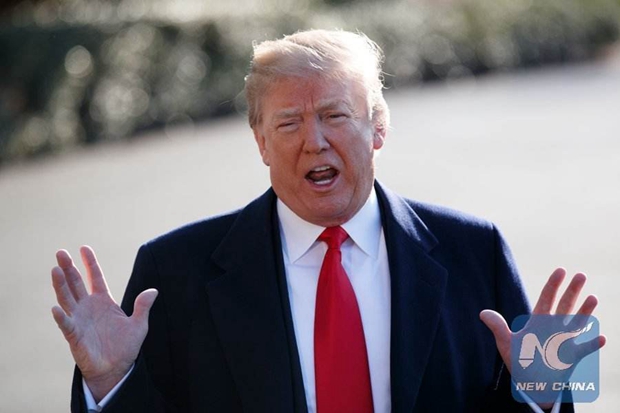A trade war between the US and EU is inevitable
- By Sumantra Maitra
 0 Comment(s)
0 Comment(s) Print
Print E-mail China.org.cn, March 19, 2018
E-mail China.org.cn, March 19, 2018

U.S. President Donald Trump [Xinhua]
The private sector in the United States created 235,000 new jobs in February, 40,000 more than the predicted 195,000. This came alongside news that U.S. Steel is rehiring people in factories, something President Trump desperately needs to show to the domestic audience before the mid-term elections. Trump's trade war rhetoric is a show to the domestic middle-class Americans living in the coal and steel belts.
Of course, there will be reactions. European Council President Tusk warned that the EU could retaliate with proportional measures. Tusk is also under intense pressure in his native Poland, a country heavily aligned with the U.S., and that makes his opposition to Trump even more ideological. Sweden, too, traditionally opposed to Trump, sounded the alarms. Cecilia Malmstrom was quoted saying, "Certain types of bourbon are on the list, as are other items such as peanut butter, cranberries and orange juice. Very soon that list will be public, so you will be able to plan your whiskey drinking." However, there's a risk that EU measures will be in violation of WTO rules.
The reaction from Beijing was strong too. While Chinese officials said that Beijing wasn't planning on actively pursuing a trade war, it also said that China will have a right to respond if the U.S. imposed controls. Filing a challenge in the WTO, Foreign Minister Wang Yi warned that a "trade war" would hurt all sides and a negotiated settlement is a better solution for now. China will take a proper and necessary response, he pointed out. Statistically China's exports rose 44.5 percent year on year to US$171.6 billion, from January's 11.1 percent growth, as quoted in the NZ Herald.
Ultimately, however, it is a trade war between Europe and the U.S. And this trade war is simply a ramification of diverging interests between the U.S. and the EU, which will continue to increase in the future. It might even benefit China, if the EU decides it needs China to balance the U.S.'s trade power. The difference between the EU and the U.S. started over NATO spending during the time of Bob Gates, and continued in the last two administrations, till Trump came in and laid down the rules. Americans are tired of paying taxes for European security, he declared, prompting European concern.
On trade, the question is even more complicated, with the trade balance in deficit for some time. The EU has consistently fined American companies. In 2016, EU commissars fined Apple 13 billion Euros for investing in Ireland. In 2017, the EU fined Google 2.4 billion Euros. Other fines are against Facebook and Intel. One might argue that the fines were not economic but political.
That, obviously, couldn't go on. It begs the question, how far is the EU willing to go to antagonize America, whose taxpayers still safeguard European security. Where does this escalation end? What if Americans elect someone more autarkic who not only starts a full-on trade war, but also declares that American soldiers will not be stationed east of the Danube? The EU policy with regards to Iran, Jerusalem, Russian sanctions, Nord Stream, Ukraine and the Chinese Belt and Road Initiative is already at odds with future American interests. It will only continue to grow and sooner rather than later, American, European and Chinese policymakers will be forced to adjust to this new structural reality.
Sumantra Maitra is a columnist with China.org.cn. For more information please visit:
http://m.formacion-profesional-a-distancia.com/opinion/SumantraMaitra.htm
Opinion articles reflect the views of their authors only, not necessarily those of China.org.cn.





